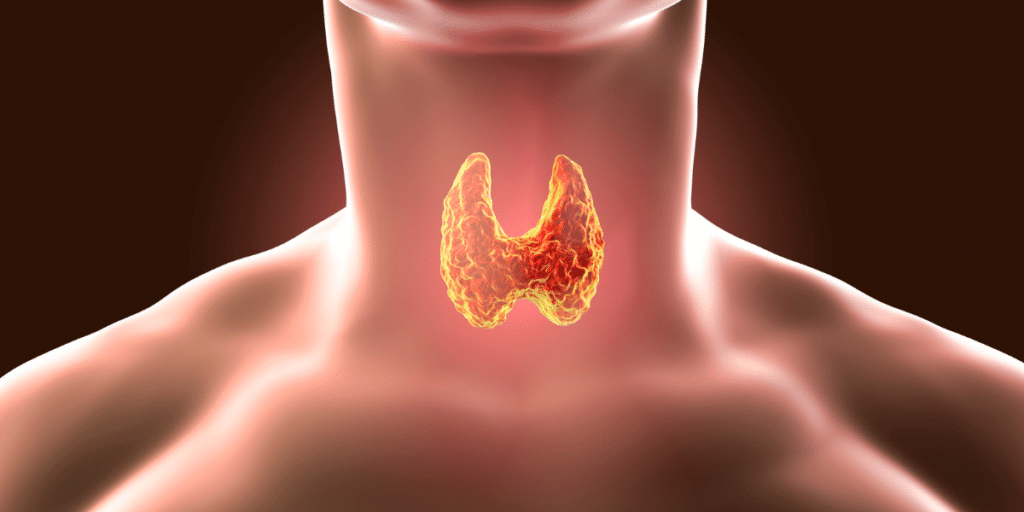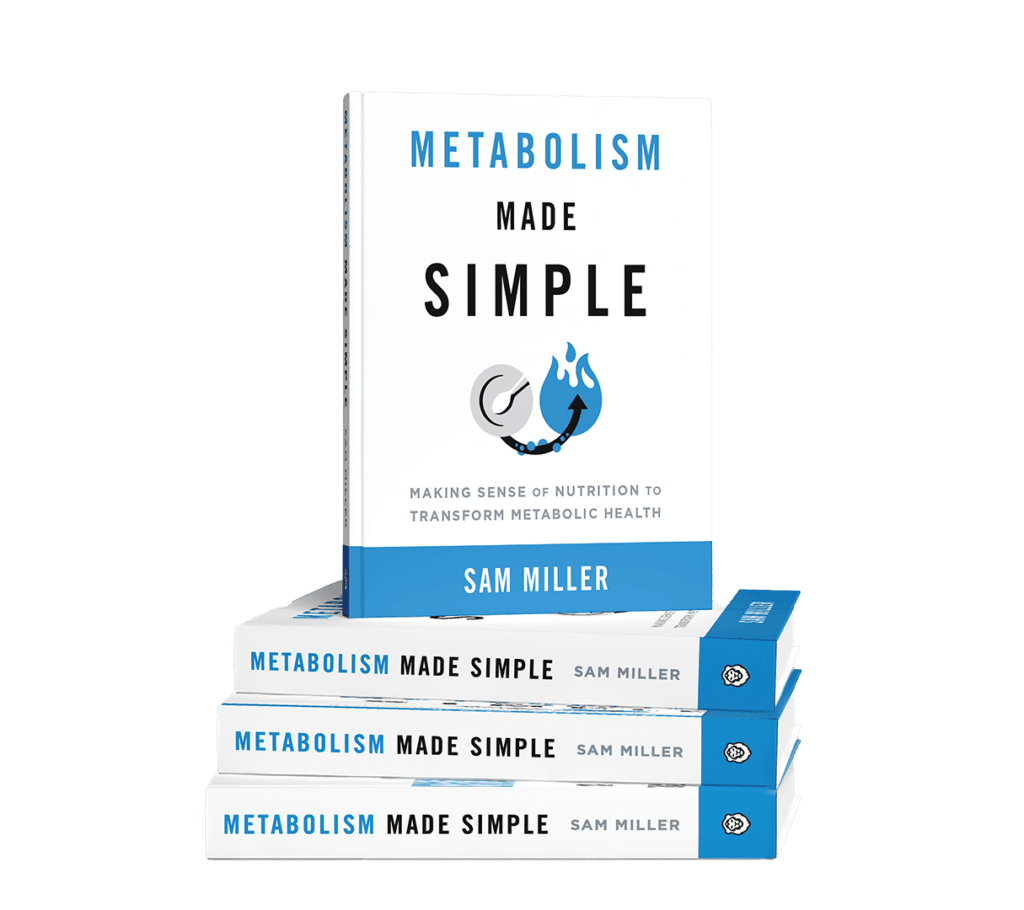There are few things in life with a stronger association than the hormone testosterone and the strength-power athlete community. This T-molecule is known for strength, hypertrophy, power, and performance in bodybuilding, powerlifting, weightlifting, and strongman.
This is a fair association, given its ability to alter physiques and abilities under the bar. It is not uncommon for athletes to seek out diet and training regimens to optimize their testosterone levels or shop for the latest test booster, adaptogen, or in some cases, performance-enhancing drugs to enhance testosterone.
But what if there was more than just one powerful “T” driving our internal health and performance?
From a physiological perspective, there are few, if any, hormones more influential than thyroid hormones, especially for athletes. Thyroid hormones not only serve as an energy regulator but as a barometer of the influence that stress has on our bodies, whether that be training stress, nutritional stress from a caloric deficit, or stress from our daily lives.
Table of Contents
What Are Thyroid Hormones?
The thyroid gland is the main metabolism gland in our bodies, and it is an integral part of the endocrine system. If our thyroid is not working correctly, we will have a difficult time achieving our desired body composition. We may also see a cascade of additional hormonal issues not exclusive to the thyroid.
The thyroid is an important gland; it is also a very sensitive gland in a regulatory sense when it comes to food consumption, activity, and stress.
Our thyroid gland produces two primary hormones: triiodothyronine (T3) and thyroxine (T4). T4 is the inactive form, while T3 is the active form of the hormone. T4 is converted into T3 in various tissues throughout the body.

T3 vs. T4
Aside from misunderstanding the level of importance of thyroid hormones, one of the biggest areas of confusion is the distinction between T3 and T4. Thyroxine, or T4, is produced by the thyroid and must be converted through enzymatic actions (subtracting an iodine molecule) to create T3 — our metabolically active thyroid hormone.
Most of this conversion takes place in the gut and the liver and is influenced by our cumulative burden of stress on the body, whether it be a nutrient deficiency, training demands, lack of sleep, or otherwise.
For the most part, T4 to T3 conversion runs smoothly, and our metabolically active T3 hormone is able to act on receptors, but certain medications, infections, autoimmune conditions, inflammation, and cumulative stress can throw a wrench in an otherwise seamless process.
Thyroid Imbalances
Thyroid hormones play a crucial role in regulating metabolism, growth, development, and body temperature. T3 and T4 are responsible for maintaining our body’s energy levels, controlling the rate at which we burn calories, and influencing protein synthesis.
Imbalances in thyroid hormone levels can lead to various health issues, including weight fluctuations, fatigue, mood changes, and metabolism disorders. It can also lead to hypothyroidism or hyperthyroidism, both of which impact our fitness abilities and our overall health.
Given the significant impact this “other T” has on our overall health, it is important to develop tactics for tracking and monitoring thyroid hormone health. Coaches and individuals can monitor elements such as basal body temperature, daily NEAT (steps), appetite, and daily energy to measure progress outside of the typical measurements and progress pictures.


How the Thyroid Impacts Your Fitness
For strength sports applications, maintaining thyroid health means influencing our total food consumption and the amount of energy we feel we have to set PRs and go about daily tasks.
When operating properly, the thyroid gland produces the thyroid hormones triiodothyronine (T3) and thyroxine (T4), which regulate many processes in our bodies, primarily hormonal balance, protein synthesis, and metabolic rate.
To provide some context of the importance of thyroid hormones and their receptors: every cell in the body has receptors for thyroid hormones, from bone and liver cells to brain and immune cells.
The only other hormone that has receptors on every cell membrane is Vitamin D. When we think of this from a greater perspective, this makes sense given the need for our bodies to perceive light and external energy for circadian rhythm as well as external energy in the form of calories available from food (thyroid regulation).
Thyroid hormones are similar to keys for our homes, and the receptors to match are door locks. Reasons thyroid hormones and their respective receptors are so important include:
- The relationship of thyroid hormones to reproductive hormones and steroid hormones; and
- The prevalence and sensitivity of thyroid receptors across the body.

The Thyroid Directly Impacts Your Reproductive Hormones
In men, thyroid receptors exist in Leydig cells, which are the main testosterone-producing cells in adult males. Thyroid hormones and their receptors play an essential role in stimulating the cells and proteins that regulate the transfer of cholesterol to make steroid hormones like testosterone. This is why it is not uncommon to see athletes with hypothyroidism have low testosterone and vice versa.
Additionally, thyroid receptors exist in ovarian cells in women. With such close proximity to a woman’s reproductive center, thyroid hormones can play an important role in menstrual cycle regulation and maintenance. This is often why we see competitors who are in a calorie deficit for extended periods of time suffer from anovulatory cycles (irregular cycles), amenorrhea (absence of cycles), or fail to ovulate each month.
An underactive thyroid also explains how overtraining can lead to loss of regular cycle health for women through influencing reproductive hormones as a means of additional energy conservation. We also see changes like a drop in body temperature and even hair loss when a woman’s thyroid is underactive.
How to Improve Your Thyroid Health
The old adage “the best time to plant a tree was years ago, the second-best time is today” rings true for thyroid health. If you aren’t already conscious of your internal health and physiology, consider these ways to monitor and improve your thyroid health.
Reduce Inflammation
Inflammation can disrupt the normal functioning of the thyroid gland, affecting hormone production and release.
Inflammation causes an uptick in corticosteroid production to create the metabolite cortisone. Corticosteroid-releasing hormones can negatively inhibit the production of thyroid-releasing hormones from the hypothalamus and also negatively impact the conversion of T4 to T3 in the body, which primarily occurs in the gut and the liver.
Managing inflammation is crucial for maintaining optimal thyroid health.
Assess Your Diet
Our diets play a significant role in our thyroid health.
We should remove any dietary triggers that promote intestinal permeability and eliminate any foods we are sensitive to. Gut issues are just one example of internal health stressors that can signal the body’s inflammatory response, such as the corticosteroid cascade mentioned above.
We should customize our diets according to our unique needs. Remember that thyroid hormones and physiology as a whole are adaptive. More or less food, exercise, sunlight, and environmental exposure can all influence our total daily energy expenditure as well as our hormone levels.
Maximize Nutrition
Maximizing nutrient density is key to maintaining optimal thyroid levels. Iron, zinc, tyrosine, iodine, selenium, and vitamins E, B2, B3, B6, C, and D are all essential for thyroid health.
Eating a diet rich in vitamins and minerals ensures that our bodies are adequately nourished to support our thyroid gland. Additional vitamins and supplements can be taken to reach optimal levels of each of these nutrients.
Periodizing nutrition is another way to maximize nutrition.
You wouldn’t randomize your lift selection before a powerlifting meet, and you shouldn’t roll the dice on your nutrition, either. Plan intentional periods of caloric deficits, maintenance, and surplus to ensure optimal thyroid output and appropriate sensitivity to thyroid hormones.
Long-term or chronic caloric deficits are the enemy here.
Be Mindful of Your Environment
Reduce toxic exposures as much as possible. Mercury, cadmium, lead, and some pesticides may negatively impact thyroid health. Toxins can have a detrimental effect on thyroid health by disrupting its normal functioning.
Certain toxins, such as heavy metals (e.g., mercury, lead), can interfere with thyroid hormone synthesis, secretion, and conversion. These toxins can disrupt the enzymes involved in hormone production, leading to imbalances in thyroid hormone levels.
Some toxins can also interfere with the function of thyroid hormone receptors. This interference can alter the response of target tissues to thyroid hormones, leading to metabolic and developmental disturbances.
Stabilize Your Blood Sugar
Stabilizing blood sugar levels is especially important for anyone with a family history of diabetes or thyroid health issues.
High blood sugar levels, often associated with conditions like prediabetes or type 2 diabetes, can lead to insulin resistance. Insulin resistance has been linked to various metabolic imbalances, including alterations in thyroid function. It can impair the conversion of T4 to T3 in peripheral tissues, potentially contributing to hypothyroidism or worsening existing thyroid issues.
On the other end of the spectrum, low blood sugar levels (hypoglycemia) can also impact thyroid health. Hypoglycemia can trigger stress responses in the body, releasing stress hormones such as cortisol. As mentioned above, elevated cortisol levels can interfere with the production and conversion of thyroid hormones, affecting overall thyroid function.
Consider an interval diet
Consider a staggered or stair-step approach to dropping calories, especially if embarking on a longer weight loss journey, such as moving up or down a weight class.
The MATADOR protocol showed greater total fat loss in a group of men who followed a two-weeks-on, two-weeks-off approach to energy restriction (calorie deficit) at 67 percent of their maintenance calories. The rationale is that the staggered approach prevents adaptations or down-regulation in metabolism from chronic dieting.
Get Tested
If you really want to know where your thyroid health stands, then get yourself tested.
The best metrics are TSH, Free T3, Reverse T3, Total T3, Total T4, Free T4, and TBG. If you suspect an autoimmune disease, consider getting your antibodies checked (this is typically more prevalent in women).
Improve Your Athletic Performance
Your “other T” levels might just be the root of untapped, fully optimized performance. A little bit of tracking and intelligent programming can go a long way in ensuring your thyroid function is at maximal potency.
If you’re serious about optimizing your health and fitness, you can’t neglect your thyroid health.
Try the above tips for improving your thyroid levels and work with a qualified fitness coach to ensure you’re staying within optimal ranges and progressing toward your goals.
References
- Sheue-Yann Cheng, Jack L. Leonard, Paul J. Davis, Molecular Aspects of Thyroid Hormone Actions, Endocrine Reviews, Volume 31, Issue 2, 1 April 2010, Pages 139–170, https://doi.org/10.1210/er.2009-0007
- Toni R. 2000 Ancient views on the hypothalamic-pituitary-thyroid axis: a historical and epistemological perspective. Pituitary 3: 83-95.
- Dyess EM, Segerson TP, Liposits Z, Paull WK, Kaplan MM, WU P. Jackson IMD, Lechan RM. 1988 Triiodothyronine exerts direct cell-specific regulation of thyrotropin-releasing hormone gene expression in the hypothalamic paraventricular nucleus. Endocrinology123:2291-2297.

















